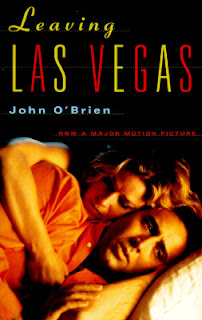It seems that Las Vegas literature doesn't always focus on the feel-good aspects of the city: a post from earlier today discussed one novel about copious use of drugs and another about teen prostitution, and now it's time to talk about alcoholism in Glitter Gulch literature.
First off, the news. Here's last week's Huffington Post article "Alcoholism Rates Could Plummet With Higher College Enrollment, Penn State Researchers Find:"
The dark joke says that alcoholism only starts after college, but new research suggests that those who don’t enroll at all have a higher risk of developing a drinking problem. Despite all the binge day-drinking, beer funnels and massive parties, researchers from Pennsylvania State University -- a school that does its share of all of the above -- found that survey participants who attended college eventually developed a more responsible relationship with alcohol. The effect was heightened among students from low-income backgrounds, and the opposite was also true -- adults who did not enroll were six times more likely to develop a drinking problem by age 33.For a novel about alcoholism, you might like Ann Leary's recently released The Good House:
Hildy Good is a townie. A lifelong resident of an historic community on the rocky coast of Boston’s North Shore, she knows pretty much everything about everyone... Hildy is good at lots of things. A successful real-estate broker, mother and grandmother, her days are full. But her nights have become lonely ever since her daughters, convinced their mother was drinking too much, staged an intervention and sent her off to rehab. Now she’s in recovery—more or less.
Alone and feeling unjustly persecuted, Hildy needs a friend. She finds one in Rebecca McCallister, a beautiful young mother and one of the town’s wealthy newcomers... When Frank Getchell, an eccentric local who shares a complicated history with Hildy, tries to warn her away from Rebecca, Hildy attempts to protect her friend from a potential scandal. Soon, however, Hildy is busy trying to cover her own tracks and protect her reputation. When a cluster of secrets become dangerously entwined, the reckless behavior of one threatens to expose the other, and this darkly comic novel takes a chilling turn.I was not a fan of Leaving Las Vegas by John O'Brien. Why not? Well, here's Leary's opening:
I can walk through a house once and know more about its occupants than a psychiatrist could after a year of sessions.That intrigues me: I want to know more. And it's clearly presented.
In contrast, here's a passage from O'Brien's novel describing his prostitute protagonist:
And she is a good thing, good at this thing. Paying for and using her, there are always men available. The tricks turn to her, for she glistens with the appealing inaccessibility of the always introspective.Sentence one: cheap wordplay, playing cheaply with words. Sentence two: there's no noun for the verbs to refer to. Maybe it's just me, but I think something like the following would sound better: "Paying for and using her, the men are always available." Sentence three: this part isn't too bad, but it still sounds a little cheesy, cliched, and overworked. If you're still interested, here's a summary of the novel:
Leaving Las Vegas, the first novel by John O'Brien, is a disturbing and emotionally wrenching story of a woman who embraces life and a man who rejects it, a powerful tale of hard luck and hard drinking and a relationship of tenderness and destruction. An avowed alcoholic, Ben drinks away his family, friends, and, finally, his job. With deliberate resolve, he burns the remnants of his life and heads for Las Vegas to end it all in the last great binge of his hopeless life.
On the Strip, he picks up Sera, a prostitute, in what might have become another excess in his self-destructive jag. Instead, their chance meeting becomes a respite on the road to oblivion as they form a bond that is as mysterious as it is immutable. Leaving Las Vegas tells a powerful story of unconditional love between two disenfranchised souls who connect for a fleeting moment.


No comments:
Post a Comment